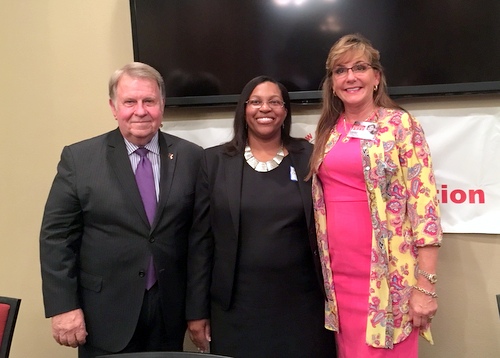
Louisiana Secretary of State contenders A.G. Crowe, Gwen Collins-Greenup and Renee Fontenot Free address the New Orleans Coalition earlier this week. (photp by Danae Columbus for UptownMessenger.com)

Danae Columbus, opinion columnist
Thousands of women candidates across the country — like two running for Secretary of State in Louisiana, Renee Fontenot Free and Gwen Collins-Greenup — will be celebrating Women’s Equality Day on Sunday, August 26. During the battle over the Equal Rights Amendment, Congresswoman Bella Abzug introduced a resolution in 1973 recognizing the August 26, 1920 passage of the 19th Amendment, which gave women the constitutional right to vote.
According to Wikipedia, women were first granted the franchise – often with limitations – as early as the 1600s. Female landowners were allowed to vote in the rural districts of Friesland, a province of the Netherlands, in 1689. In 1718 female taxpaying members of city guilds could vote in local city elections in Sweden. Female suffrage in the Assembly of Corsica was established in 1755. In 1756, the town of Uxbridge, Mass., allowed one woman – Lydia Taft – to vote in a town meeting. In 1776, the state of New Jersey welcomed women voters but rescinded that welcome in 1807. Finland first allowed “taxpaying” women living in the countryside to vote for municipal elections in 1863. In 1864 the Kingdom of Bohemia opened voting to taxpaying women and women in “learned professions.” The territory of Wyoming granted full suffrage for women in 1869 followed by the Utah territory in 1870.
In 1893 the colony of New Zealand was the first self-governing country in the world to give women the right to vote. Australia followed in 1894. In 1888, a failed constitutional amendment proposed to extend suffrage and the right to hold office to women in the U.S., but it was limited to spinsters and widows who owned property. In 1893, Colorado was the first state to enfranchise women by popular vote. Other states that came on board before the 1920 constitutional amendment included Minnesota, Oklahoma, South Dakota, Michigan, Montana, Nevada, New York, Kansas, Alaska, Oregon, Washington and California. Albania and Czechoslovakia granted the franchise the same year as the U.S.
Every president since Richard Nixon- who was in office the year the amendment passed – has issued an annual Women’s Equality Day proclamation. Since President Donald Trump was slow to issue the 2017 proclamation, New York Gov. Andrew Cuomo called on him to do so by tweeting “A woman’s place is in the voting booth.” President Trump has yet to issue the 2018 proclamation.
In his 1973 proclamation, President Richard Nixon aptly stated that, “The struggle for women’s suffrage…was only the first step toward full and equal participation of women in our Nation’s life. In recent years, we have made other giant strides by attacking sex discrimination through our laws and by paving new avenues to equal economic opportunity for women. Today, in virtually every sector of our society, women are making important contributions to the quality of American life. And yet, much still remains to be done.”
Despite the “giant strides” President Nixon referenced in his remarks 45 years ago, historically large numbers of women are running for office this year to address what “remains to be done.” Many concerns are social issues that impact women and their families. Women in Louisiana will not receive equal economic opportunity until all-encompassing equal pay legislation is passed. Sexual harassment affects millions. High unemployment rates divide families. Lack of affordable health care and prescriptions is a burden. Roe V. Wade may be overturned. Poor quality education limits future potential. The opioid epidemic is destroying our communities. Poverty creates an environment for criminal behavior. Discrimination based on sexual orientation still exists.
Women are making important contributions to society but have the ability to do so much more. Females candidates like Gwen Collins-Greenup, Renee Fontenot Free, Julie Stokes and others need funds and volunteers to create successful campaigns. Remember how suffragists struggled to win the right to vote. Don’t just sit on the sidelines, participate.
MAYOR CANTRELL TAKING THE BULL BY THE HORNS
Some voters wondered what kind of mayor LaToya Cantrell might be, especially because of her slow start. Several of Cantrell’s moves this week seem to show she is acting strong, like most previous mayors. First, Cantrell removed Andreanecia Morris — one of the city’s most respected fair housing advocates — from the HANO board. Morris’s sin was voting against the contract renewal of HANO executive director Greg Fornter, whose leadership she questioned.
Next Cantrell asked for the resignation of several Sewerage and Water Board executive staff members who had the audacity of seek substantial raises at the same time that thousands of citizens are sweating termination of services. With both these actions, Cantrell sent a clear signal that she is a tough and willing to yield a knife.
It is somewhat surprising that Cantrell has chosen to “own” the SWB problem, given she did not create it. With the much anticipated arrival of new director Ghassan Korban, Cantrell will have a leader in place with the technical background to fully analyze the agency’s many problems and suggest strategic solutions. Whether city government will be able to implement his recommendations – including the funding needed – is a conversation for the future. In the meantime, Cantrell’s message is clear: don’t mess with me!
Danae Columbus, who has had a 30-year career in politics and public relations, offers her opinions on Thursdays. Her career includes stints at City Hall, the Dock Board and the Orleans Parish School Board and former clients such as District Attorney Leon Cannizzaro, City Council members Stacy Head and Jared Brossett, City Councilwoman-elect Helena Moreno, Foster Campbell, Lt. Gov. Jay Dardenne, former Sheriff Charles Foti and former Councilwoman Cynthia Hedge-Morrell.